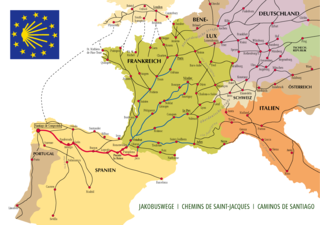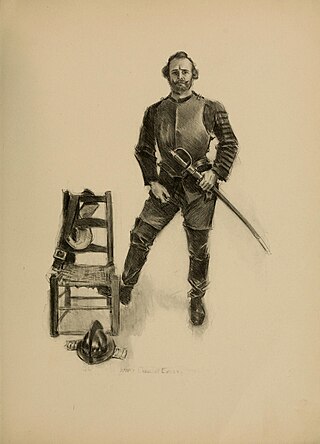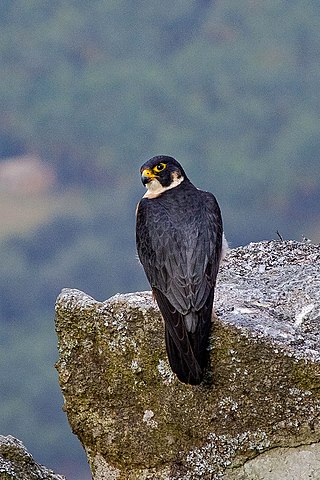Related Research Articles

1620 (MDCXX) was a leap year starting on Wednesday of the Gregorian calendar and a leap year starting on Saturday of the Julian calendar, the 1620th year of the Common Era (CE) and Anno Domini (AD) designations, the 620th year of the 2nd millennium, the 20th year of the 17th century, and the 1st year of the 1620s decade. As of the start of 1620, the Gregorian calendar was 10 days ahead of the Julian calendar, which remained in localized use until 1923.

The peregrine falcon, also known simply as the peregrine, and historically as the duck hawk in North America, is a cosmopolitan bird of prey (raptor) in the family Falconidae. A large, crow-sized falcon, it has a blue-grey back, barred white underparts, and a black head. The peregrine is renowned for its speed. It can reach over 320 km/h (200 mph) during its characteristic hunting stoop, making it the fastest animal on the planet. According to a National Geographic TV program, the highest measured speed of a peregrine falcon is 389 km/h (242 mph). As is typical for bird-eating (avivore) raptors, peregrine falcons are sexually dimorphic, with females being considerably larger than males.

Falconry is the hunting of wild animals in their natural state and habitat by means of a trained bird of prey. Small animals are hunted; squirrels and rabbits often fall prey to these birds. Two traditional terms are used to describe a person involved in falconry: a "falconer" flies a falcon; an "austringer" keeps Goshawks and uses accipiters for hunting. In modern falconry, the red-tailed hawk, Harris's hawk, and the peregrine falcon are some of the more commonly used birds of prey. The practice of hunting with a conditioned falconry bird is also called "hawking" or "gamehawking", although the words hawking and hawker have become used so much to refer to petty traveling traders, that the terms "falconer" and "falconry" now apply to most use of trained birds of prey to catch game. However, many contemporary practitioners still use these words in their original meaning.

James the Great was one of the Twelve Apostles of Jesus. According to the New Testament, he was the second of the apostles to die, and the first to be martyred. Saint James is the patron saint of Spain and, according to tradition, what are believed to be his remains are held in Santiago de Compostela in Galicia.
Peregrine(s), or (Latin) Peregrinus may refer to:

The Camino de Santiago, or in English the Way of St. James, is a network of pilgrims' ways or pilgrimages leading to the shrine of the apostle James in the cathedral of Santiago de Compostela in Galicia in northwestern Spain, where tradition holds that the remains of the apostle are buried.

Peregrine White was the first baby boy born on the Pilgrim ship the Mayflower in the harbour of Massachusetts, the second baby born on the Mayflower's historic voyage, and the first known English child born to the Pilgrims in America. His parents, William White and his pregnant wife Susanna, with their son Resolved White and two servants, came on the Mayflower in 1620. Peregrine White was born while the Mayflower lay at anchor in the harbor at Cape Cod. In later life, he became a person of note in Plymouth Colony, active in both military and government affairs.

Eustace, also rendered Eustis, is the rendition in English of two phonetically similar Greek given names:
Rónán, anglicised as Ronan, is an Irish and Breton male given name and surname. In modern sources, it is traditionally derived from rón, the Irish word for 'seal'.

The name Basil comes from the male Greek name Vassilios, which first appeared during the Hellenistic period. It is derived from "basileus", a Greek word of pre-Hellenic origin, meaning "king", from which words such as basilica and basilisk as well as the eponymous herb basil derive, and the name of the Italian region Basilicata, which had been long under the rule of the Byzantine Emperor.
St. Peregrine the martyr was an early Christian martyr who died because he and fellow Christians refused to worship the Roman Emperor Commodus on his birthday.
Oceanus Hopkins was the only child born on the Mayflower during its historic voyage which brought the English Pilgrims to America. Another boy, Peregrine White, was born on board, after arriving in America, as the ship lay at anchor.

Miles or Myles is a Norman French masculine given name of uncertain meaning. It might have been a changed diminutive of the name Michael that was influenced by miles, the Latin word for a soldier, because of associations with Archangel Michael, the Roman Catholic patron saint of the military. Milo, the variant of the name used most often during the medieval era, might also have been influenced by the Slavic word element -mil, meaning gracious. Myles is a variant spelling in English. In Ireland, the name was used as an English substitute for Irish language names such as Maolra, or Maolmhuire, both meaning devoted to Mary, Maolmhorda, meaning servant of the great, and Maolruanaí, meaning servant of the champion. Development of the name might also have been influenced by the Persian name Mylas, meaning brave. The original name of Miles, an Orthodox Christian saint, was Mylas. The name has been in regular use in the Anglosphere since the 1500s. It was popularized in England by Myles Coverdale, who produced the first complete printed translation of the Bible into English in 1535. In the United States, the name became well-known due to Myles Standish, a soldier who arrived on Plymouth Rock on the Mayflower with the Pilgrims in 1620. American poet Henry Wadsworth Longfellow wrote a popular 1858 poem, The Courtship of Miles Standish, in which the fictionalized Standish is rejected by Priscilla Mullins, who chooses John Alden as her husband instead. Miles and Myles were both more commonly used in the United States than in the United Kingdom by the 1800s due to usage by Irish immigrants to the United States and the influence of Miles Standish. There was an increase in usage from the mid- to late 20th century associated with jazz instrumentalist Miles Davis and with the popularity of fictional characters such as Star Trek character Miles O'Brien, Myles Mitchell, a character on the 1990s American television series Moesha, Miles Edgeworth, a character from the Ace Attorney video game franchise, and fictional Marvel Comics superhero Miles Morales.
Peregrine (Peregrinus) of Auxerre is venerated as the first bishop of Auxerre and the builder of its first cathedral. A strong local tradition states that he was a priest of Rome appointed by Pope Sixtus II to evangelize this area at the request of the Christians resident in that part of Gaul. He preached at Marseilles, Lyon, and converted most of the inhabitants of Auxerre to Christianity.
Took is a variant of the English surname Tooke, originally found predominantly in the East Anglia region of the United Kingdom.
Astius is a 2nd-century Christian martyr venerated by the Roman Catholic and Eastern Orthodox churches. He was the bishop of Dyrrhachium.

Saint Cetteus is the patron saint of Pescara. He was a bishop of the 6th century, elected to the see of Amiternum in Sabina in 590, during the pontificate of Gregory the Great.

The Church of San Pellegrino in Vaticano is an ancient Roman Catholic oratory in the Vatican City, located on the Via dei Pellegrini. The church is dedicated to Saint Peregrine of Auxerre, a Roman priest appointed by Pope Sixtus II who had suffered martyrdom in Gaul in the third century. It is one of the oldest churches in the Vatican City.

The shaheen falcon is a non-migratory subspecies of the peregrine falcon found mainly in India It has also been described as a migratory subspecies. Other common names for the subspecies include the black shaheen. The word shaheen in these names may also be spelled as shahin. This species was termed as the black shaheen by falconers to separate it from the true shaheen of Persian literature. Scholars of Persian and the Russian ornithologist Georgi Petrovich Dementiev have noted that the name shaheen in Persian literature actually referred to Falco peregrinus babylonicus.

William White was a passenger on the Mayflower. Accompanied by his wife Susanna, son Resolved and two servants, and joined by a son, Peregrine, on the way, he traveled in 1620 on the historic voyage. He was a signatory to the Mayflower Compact and perished early in the history of Plymouth Colony.
References
- ↑ "Definition of PEREGRINE". Merriam-Webster. 29 February 2024. Retrieved 9 March 2024.
- 1 2 "Peregrine Name Meaning, Family History, Family Crest & Coats of Arms". HouseOfNames. 4 June 2018. Retrieved 9 March 2024.
- 1 2 Campbell, Mike (28 February 2019). "Meaning, origin and history of the name Peregrine". Behind the Name. Retrieved 9 March 2024.
- ↑ "Peregrine Name Meaning & Peregrine". Ancestry. 15 June 2021. Retrieved 9 March 2024.
- ↑ "Peregrine". Nameberry. 27 February 2024. Retrieved 9 March 2024.